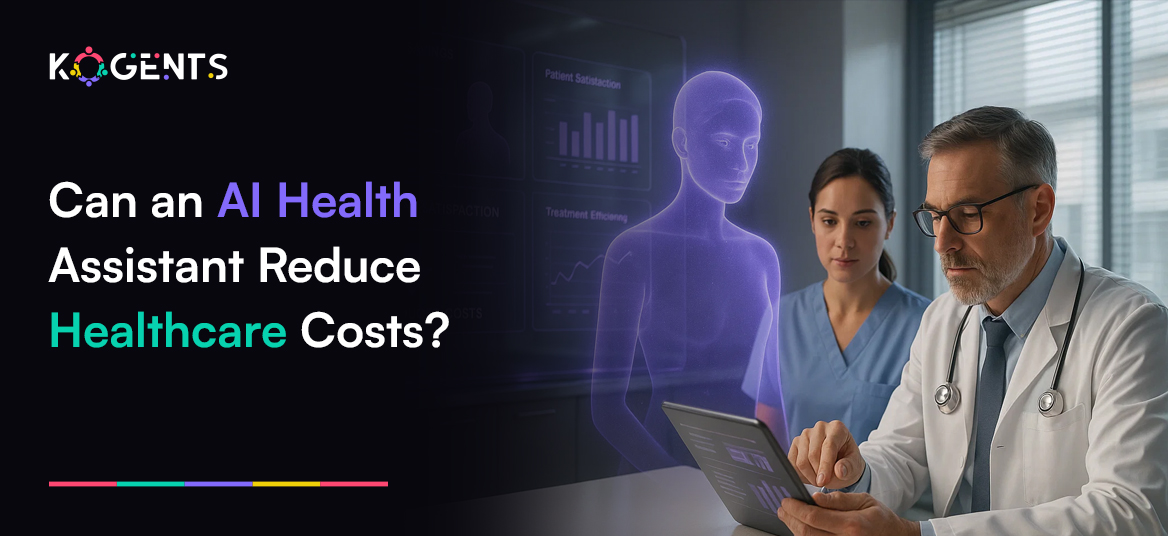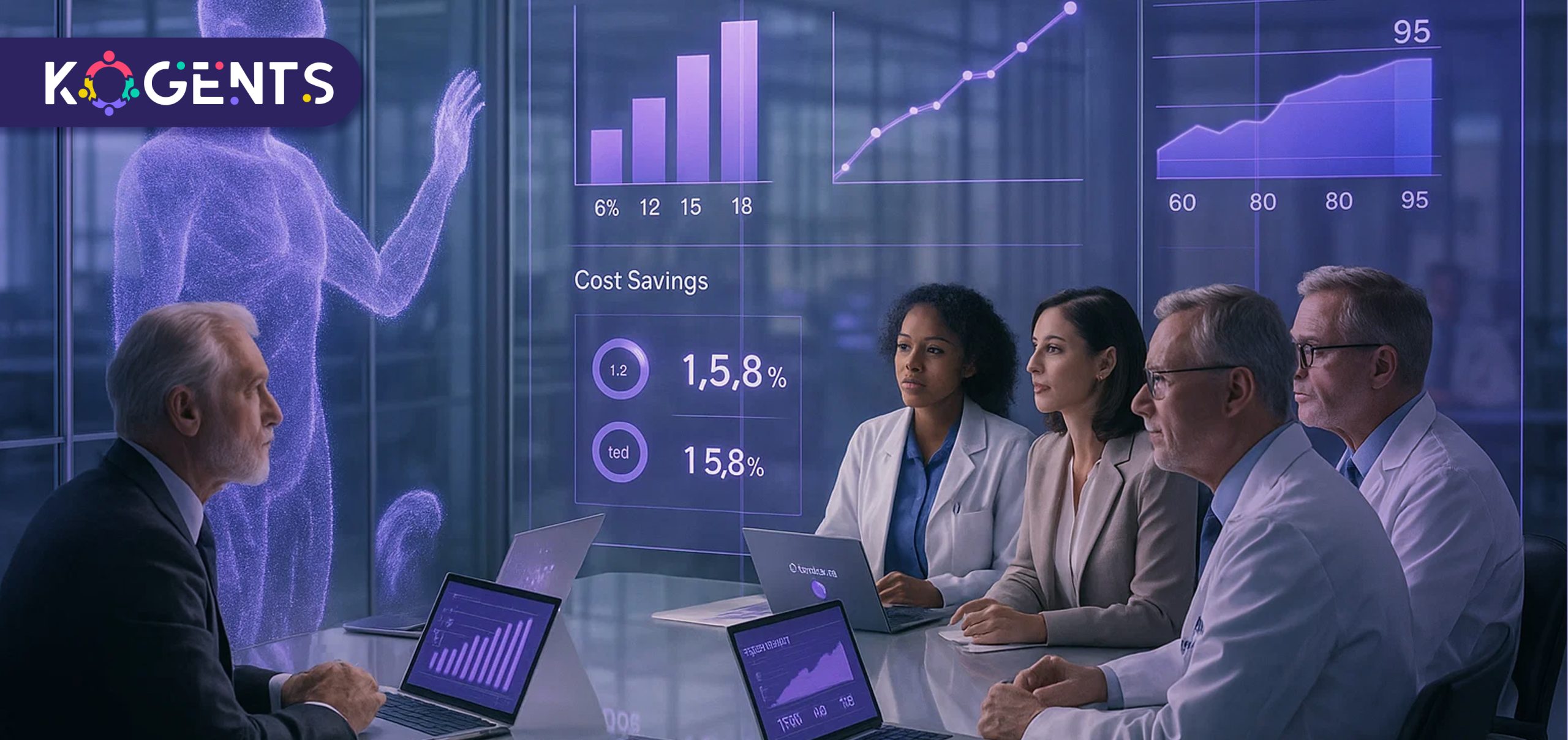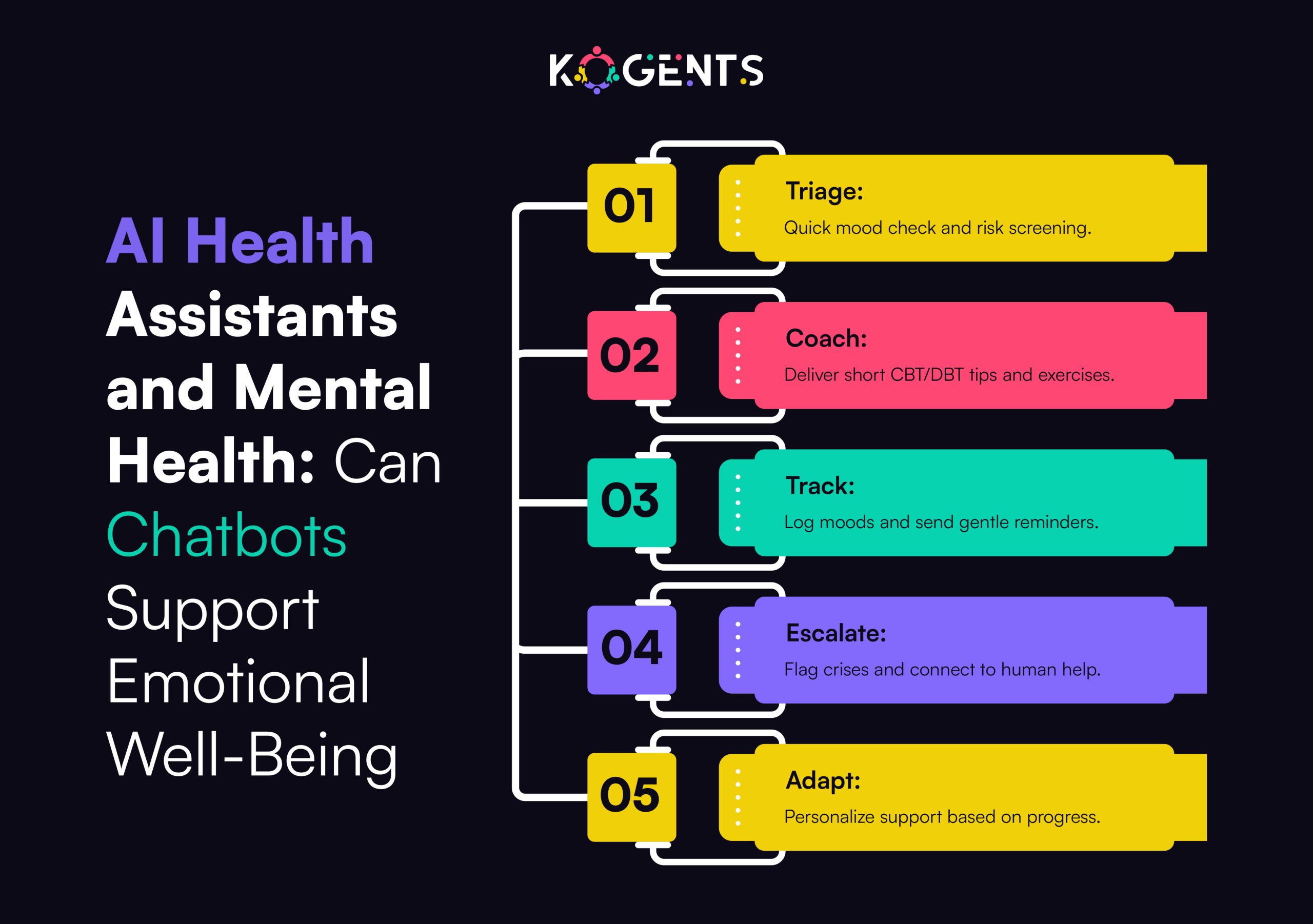Can an AI Health Assistant Reduce Healthcare Costs?

Summary:
Ever feel like you’re jumping through hoops just to get the care you need, but wish there was an easier way forward?
Well, you’re not alone in this case.
With the rising costs of healthcare in the United States, finding effective and affordable solutions is a pressing concern for many.
Virtual health assistants are revolutionizing the healthcare environment by providing 24/7 support and personalized guidance.
AI-powered tools help patients adhere to their treatment plans and make informed decisions about their care.
By leveraging these innovative solutions, you can take control of your health journey and potentially reduce your healthcare expenses.
But how exactly do these AI health assistants work, and what benefits do they offer? Let’s uncover this in this blog.
Key Takeaways
- Discover how AI-powered health assistants provide round-the-clock support and personalized guidance.
- Explore the growing financial challenges in the American healthcare system and how technology offers promising solutions.
- Learn about the core features of modern AI health assistants and their impact on patient outcomes.
- Understand how virtual health platforms can bridge gaps in care and enhance medication adherence.
- Find out how AI tools can support both patients and healthcare providers.
The Rising Challenge of Healthcare Costs in America
America is facing a healthcare cost crisis that impacts patients, providers, and the overall healthcare system.
The financial strain of healthcare costs is a pervasive issue that affects various aspects of the medical care setup.
The United States spends a significant portion of its GDP on healthcare, with a total expenditure of $4,866.5 billion in 2023.
This excessive expenditure contributes to the financial burden on both patients and healthcare providers.
Financial Burden on Patients and Providers
You may be among the millions of Americans who delay or avoid seeking medical care due to concerns about cost, potentially leading to more serious and expensive health issues down the road.
Healthcare providers face their own financial challenges, including unpaid medical bills and complex billing systems that increase operational costs.
AI health assistants, including digital health assistants, health chatbots, and AI wellness assistants, offer a path forward.
By delivering round-the-clock support, automating routine tasks, and enhancing medication adherence, they help lower costs and improve outcomes.
Integrated with remote patient monitoring (RPM) systems, these tools enable early detection of health issues and reduce unnecessary hospital visits.
Modern digital health tools and AI diagnostic assistants provide clinical decision support by analyzing data and offering evidence-based recommendations.
What Is an AI Health Assistant?
An AI health assistant comes equipped with several key features that enhance patient care. These include advanced machine learning algorithms that improve over time, natural language processing (NLP) for better understanding, and integration with wearable devices for real-time data collection.
- Your assistant uses artificial intelligence (AI) and continuously learns from interactions to improve its accuracy and effectiveness.
- Moreover, Chatbot capabilities allow it to answer patient questions in natural, everyday language, making it more accessible.
- Modern platforms integrate with remote patient monitoring (RPM) systems and digital health tools, enabling continuous tracking of vital signs and early detection of health risks.
- Many also provide clinical decision support, helping healthcare providers make data-driven, evidence-based recommendations.
- When combined with telehealth/telemedicine services and healthcare workflow automation, AI health assistants streamline communication, reduce administrative burdens, and deliver a seamless, patient-centered care experience.
How AI Technology Powers Modern Health Assistants
The technology behind AI health assistants is sophisticated, using complex systems that analyze medical literature and clinical guidelines to provide evidence-based recommendations tailored to your health profile.
This approach is consistent with standards highlighted by the Agency for Healthcare Research and Quality (AHRQ), which promotes evidence-based practice in healthcare decision-making (Bipartisan Policy Center).
Advanced AI assistants can integrate with wearable devices and health monitoring tools to collect real-time data on your vital signs and activities, a practice supported by research on remote patient monitoring with AI that demonstrates its potential to reduce hospitalizations and improve outcomes.
Safety and compliance are also crucial. These assistants follow sophisticated clinical escalation systems to ensure patients receive appropriate care when necessary, aligning with oversight principles emphasized by the U.S. Food & Drug Administration’s (FDA) Digital Health Advisory Committee and The Joint Commission’s telehealth accreditation guidelines (Reuters, PMC).
By providing accurate, timely, and guideline-based information, AI health assistants empower you to take a more active role in your healthcare.
This improves patient experience and contributes to a more efficient healthcare system, a goal consistent with the Centers for Medicare & Medicaid Services (CMS) efforts to encourage value-based care models.

How AI Health Assistants Drive Cost Reduction
AI health assistants are emerging as a key factor in reducing healthcare expenditures.
By streamlining various processes and improving patient care, these assistants are proving to be a valuable asset for healthcare providers.
Preventative Care and Early Intervention
AI health assistants facilitate preventative care by identifying potential health issues early on. This enables timely intervention, reducing the likelihood of costly complications down the line. By focusing on prevention, healthcare costs can be significantly lowered.
Reducing Unnecessary Hospital Visits
These assistants can pre-screen patients and gather relevant health information before appointments, making clinical visits more efficient.
This not only saves time for both patients and healthcare providers but also reduces unnecessary hospital visits, thereby cutting costs.
Streamlining Administrative Processes
AI health assistants and AI agents for healthcare automation streamline routine administrative tasks such as appointment scheduling and data entry.
This reduces the workload for the healthcare team, allowing them to focus more on direct patient care. The table below highlights the benefits of streamlining administrative processes.
By leveraging AI technology, healthcare providers can optimize their resources, improve care quality, and reduce costs.
The integration of AI health assistants is a step towards a more efficient and cost-effective healthcare system.
Improving Medication Adherence and Management
Medication adherence technology
Medication adherence is a critical aspect of healthcare that AI health assistants can significantly improve.
By leveraging technology, these assistants can help you stay on track with your medication regimen.
The Cost of Non-Adherence
Non-adherence to medication can lead to significant healthcare costs, including hospital readmissions and additional treatments.
Studies have shown that non-adherence can result in billions of dollars in unnecessary healthcare expenses annually.
How AI Assistants Boost Adherence Rates
They can boost adherence rates by sending personalized medication reminders, providing education on medication importance, and tracking your adherence behavior.
These tools adapt to your behavior patterns, ensuring the most effective reminder strategies are used.
- Receive personalized reminders based on your prescription schedule.
- Gain education on the benefits and potential side effects of your medications.
- Benefit from proactive support in managing side effects and addressing concerns.
Remote Monitoring and Chronic Disease Management
Remote patient monitoring systems
You can now take control of your health with the help of remote monitoring systems designed for chronic disease management.
These systems enable continuous tracking of your vital signs and health metrics, allowing for timely interventions.
Cost-Effective Monitoring of Chronic Conditions
Remote monitoring reduces the need for hospital visits, making it a cost-effective solution for managing chronic conditions.
Your AI health assistant continuously collects and analyzes data, identifying patterns and trends that might not be apparent during occasional doctor visits.
Real-Time Data Collection and Analysis
Real-time analysis allows for immediate feedback on how lifestyle factors like diet, exercise, and sleep affect your health metrics, enabling you to make informed adjustments.
The comprehensive data collected creates a more complete health profile that helps healthcare providers make more accurate diagnoses and treatment recommendations.
The insights generated from your data can help personalize your care plan, focusing interventions on the specific factors most affecting your health.

Personalized Health Insights and Preventive Care
By leveraging AI technology, you can gain valuable insights into your health and take proactive steps towards preventative care.
AI health assistants analyze your data to provide customized recommendations that address your specific health needs.
Customized Health Recommendations
Your AI health assistant can offer customized advice on lifestyle modifications, such as diet and exercise, to help mitigate potential health risks.
By understanding how your daily habits affect your health, you can make informed decisions to improve your well-being.
Identifying Risk Factors Before They Become Costly
- Your AI health assistant can identify potential risk factors in your health data that might indicate developing problems before they require expensive interventions.
- By analyzing patterns in your vital signs, symptoms, and behaviors, these systems can detect subtle changes that might escape notice during routine care.
- The assistant can provide specific advice about lifestyle modifications that address your personal risk factors, potentially preventing the development of chronic conditions.
- Early identification of health risks allows for targeted preventative measures that are typically much less expensive than treating established diseases.
- The AI can help you understand how specific behaviors like diet choices, exercise habits, and stress management affect your personal health risks.
- These insights enable a proactive approach to health management, shifting resources from expensive disease treatment to more cost-effective prevention.
- By highlighting connections between your daily habits and health outcomes, AI assistants make abstract health risks more concrete and actionable.
Note: With AI-driven health insights, you can take a proactive role in managing your health and reducing the likelihood of costly medical interventions in the future.
Case Study Analysis: Esper’s
The implementation of AI health assistants has led to measurable reductions in healthcare costs.
Esper, an AI health assistant, has achieved a significant 36% increase in patient adherence. By handling outreach on behalf of staff, Esper streamlines incoming phone calls, scheduling, and inquiries.
It assists with full-service onboarding, consent, enrollment, health assessments, patient scheduling, medication reminders, and auto-refilling device supplies, ultimately improving outcomes for patients.
Reducing Administrative Burden for Healthcare Providers
AI health assistants significantly reduce the administrative burden on healthcare teams by automating routine tasks like appointment scheduling and medication reminders.
They can handle frequently asked questions from patients, freeing up staff time for more complex patient interactions.
| Benefits | Description | Impact |
| Automated Tasks | Appointment scheduling, medication reminders | Reduced administrative burden |
| Patient Engagement | Handling patient inquiries, health assessments | Improved patient satisfaction |
| Staff Reallocation | Freeing up staff for complex tasks | Enhanced care quality |
Implementing an AI Health Assistant in Your Healthcare Routine
By leveraging this technology, you can enhance your overall health management strategy.
Choosing the Right AI Health Assistant
When selecting an AI health assistant, look for platforms that can integrate with your existing healthcare services.
Consider the features that are most important to you, such as medication reminders or personalized health insights.
Integrating AI Support with Traditional Healthcare
To get the most out of your AI health assistant, use it as a complement to traditional healthcare services. Discuss your use of the assistant with your healthcare provider to ensure they’re aware of the additional support you’re receiving.
- Maximize benefits by using your AI health assistant to track your health data privacy and security and share insights with your healthcare provider.
- Enhance your visits by using the assistant’s insights to focus on key issues during in-person appointments.
- Remember, while AI health assistants provide valuable support, critical health decisions should still involve consultation with qualified healthcare professionals.
AI Health Assistants: Paving the Way for a Sustainable Healthcare Future!
By leveraging AI health assistants, you can take a proactive approach to healthcare cost management.
These innovative tools offer promising solutions for reducing healthcare costs while improving patient outcomes and experiences.
As AI technology advances, you can expect more sophisticated health assistants that integrate seamlessly with traditional healthcare and daily life.
The future of healthcare cost management will involve greater collaboration between AI systems and human providers.
While AI health assistants aren’t a complete solution, they represent an important tool in creating more sustainable healthcare systems.
By embracing AI health assistants, you can enjoy better health outcomes and contribute to more efficient healthcare resource use. So, pair up with Kogents AI today and drop an email at info@portal.kogents.ai or give us a call at (267) 248-9454.
FAQs
How can an AI health assistant help me manage my medication regimen?
An AI health assistant can provide personalized reminders, track your medication adherence, and offer guidance on potential interactions or side effects, helping you stay on top of your treatment plan.
Can an AI health assistant help me monitor my chronic condition remotely?
Yes, many AI health assistants offer remote monitoring capabilities, allowing you to track your vital signs, symptoms, and other relevant data in real-time, and share it with your healthcare provider for timely interventions.
How do AI health assistants ensure the accuracy of the information they provide?
AI health assistants rely on high-quality data and are trained on evidence-based guidelines to provide accurate insights and recommendations, helping you make informed decisions about your care.
Can I trust the advice provided by an AI health assistant?
While AI health assistants are designed to provide reliable guidance, it’s essential to consult with your healthcare provider before making any significant changes to your treatment plan or care routine.
How can an AI health assistant support my overall well-being?
By providing personalized insights, recommendations, and support, AI health assistants can help you adopt healthier habits, manage stress, and stay on track with your care plan, promoting overall well-being and better health outcomes.
Are AI health assistants secure and compliant with healthcare regulations?
Reputable AI health assistants adhere to strict data protection standards and comply with relevant regulatory oversight, such as HIPAA compliance, to ensure the confidentiality and integrity of your personal and medical information.
Can I access my AI health assistant through multiple devices?
Many AI health assistants offer multi-platform access, allowing you to engage with the tool through various devices, such as smartphones, tablets, or computers, for added convenience and flexibility.
How does it compare to telehealth?
If you’ve searched “AI health assistant vs telehealth nurse,” AI tools offer instant, automated help, while telehealth nurses provide human judgment; both work best together.
Are AI health assistants HIPAA-compliant and regulated by the FDA?
Searches like “HIPAA compliance for AI health assistants” or “FDA regulation of health chatbots” are common, reputable tools that follow strict privacy rules and FDA guidance.
Who are the top providers?
Suki AI health assistant, or Microsoft Health AI platform, points to leading companies offering AI-driven clinical and patient support solutions.

Kogents AI builds intelligent agents for healthcare, education, and enterprises, delivering secure, scalable solutions that streamline workflows and boost efficiency.